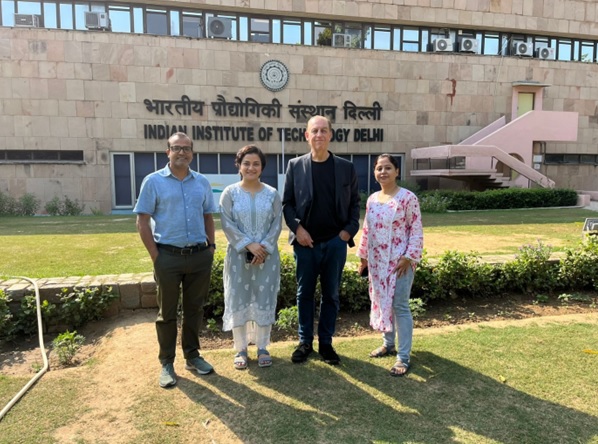Mae'r cynnwys hwn ar gael yn Saesneg yn unig.
In October, as part of WISERD’s civil society and animal welfare research, a workshop was held in New Delhi. Academics present included co-investigators Professors Paul Chaney and Sarbeswar Sahoo, along with Research Associates Dr Pooja Sharma and Dr Debashree Saikia (pictured).
Our work involves comparative analysis of developments in Wales, Scotland, England and India. We are concerned with expanding existing conceptions of civil society to include greater understanding of the multifaceted relations between humans and non-humans that span a key range of areas including politics, law, public policy, sociology, religion and the environment.
This new research examines civil society activism on a range of animal welfare issues. One of the key aspects of campaigning we are examining through interviews with non-governmental organisations (NGOs), is their lobbying and voluntary action in relation to feral animals. This is a growing problem. It is estimated that India currently has around 62 million stray dogs.
Our emerging findings provide a number of insights. They show the diverse ways NGOs are lobbying policymakers to gain greater support and resources. In particular, they are calling for more assistance for members of the public who feed stray animals for compassionate reasons. Civil society campaigners underline the key role feeders can play in boosting the ongoing neutering/population control campaign in the country – as well improving animal well-being more generally.
Notably, the government’s action on feral animals has recently been strongly criticised by NGO campaigners in relation to the recent G20 summit in Delhi that took place in September. For this showcase event the authorities undertook a major programme of removing stray dogs from the streets and confining them in crowded compounds. Campaigners allege the process involved widespread cruelty to the animals. Later, after the summit when the dogs were released, campaigners also allege that they were often returned to incorrect locations, leading to territorial fights between the strays – with some killed or badly injured.
Such animal welfare concerns endure despite the fact that human-animal coexistence is codified in India’s constitution (Article 51A(g)). This calls for compassion for animals and is accompanied by a range of animal protection laws – such as the Prevention of Cruelty to Animals Act, 1960. From an international perspective, these enactments are progressive and are partly rooted in religion. Hinduism, followed by around 80 per cent of Indians, teaches that all living beings are holy and should be revered. Islam also highlights the need for compassion to animals.
Our research highlights the way NGOs are using legal rulings, notably a series of Supreme Court judgements on constitutional human/non-human coexistence rights – as a key argument in their attempts to garner wider public support for their work on animal welfare and to lobby parliamentarians to outlaw culling, and end abuse and cruelty in so-called “sports” and other practices involving animals.
NGO testimony also reveals the challenges of activism over welfare rights for stray dogs. In particular, the difficulties civil society activists experience because of what they claim are inflated public health arguments, misreporting in the media and a resulting moral panic. This has led to a backlash against their work from official quarters and from some members of the public. For example, the state government in Kerala has petitioned the Supreme Court to amend existing legal safeguards and allow systematic culling. The high incidence of rabies was one of the core reasons cited in this legal challenge. The latter is a serious ‘zoonotic’ viral infection passed on by bites that affects the brain and central nervous system. The World Health Organisation estimates up to 20,000 people die of the disease in India each year.
NGOs also allude to how their work is affected by shifting levels of public support in the wake of the ongoing moral panic over a number of high-profile deaths from stray dog attacks, including that of an infant who was killed whilst sleeping next to her mother in Sirohi hospital, Rajasthan – and last month’s case of a high profile businessman who died following his injuries trying to escape a pack of dogs.

